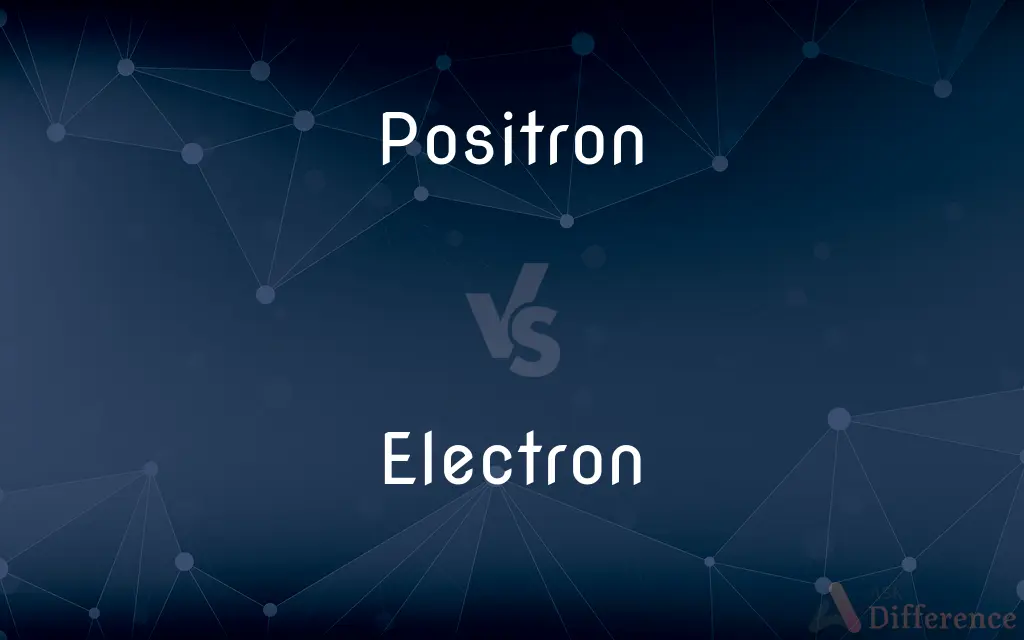Positron vs. Electron — What's the Difference?
By Tayyaba Rehman & Fiza Rafique — Updated on May 1, 2024
A positron is the antimatter counterpart of the electron, possessing the same mass and spin but opposite charge.

Difference Between Positron and Electron
Table of Contents
ADVERTISEMENT
Key Differences
Electrons are fundamental subatomic particles with a negative charge, playing a crucial role in electricity, magnetism, and chemical bonding. Conversely, positrons are positively charged antiparticles of electrons, identical in mass and spin but with an opposite charge.
When an electron meets a positron, they annihilate each other, producing a burst of energy in the form of gamma rays. This is due to their opposite charges, whereas interactions among electrons involve repulsion or attraction with other charged particles.
Electrons are abundant in the universe, present in atoms and influencing the structure and properties of elements. On the other hand, positrons are rare in nature, typically produced in high-energy phenomena like cosmic rays or artificially in particle accelerators.
In terms of applications, electrons are utilized in a wide array of technologies including electronics, welding, and microscopy. Positrons, however, are primarily used in medical imaging techniques such as positron emission tomography (PET), which helps in diagnosing diseases.
Electrons can be trapped and manipulated in various materials to create currents and signals essential for electronic devices. Positrons, due to their instability in normal matter, are used in environments controlled for scientific research, particularly in the study of antimatter.
ADVERTISEMENT
Comparison Chart
Charge
Negative
Positive
Mass
9.109 x 10^-31 kg
9.109 x 10^-31 kg
Spin
1/2
1/2
Common Occurrence
Abundant in the universe, in all atoms
Rare, produced in high-energy environments
Applications
Electronics, electricity, magnetism
Medical imaging (PET scans)
Compare with Definitions
Positron
An elementary particle with positive charge.
Interaction of a positron and an electron results in annihilation.
Electron
The antimatter counterpart of the electron with a positive charge.
Positrons are emitted in some types of radioactive decay.
Positron
A negatively charged subatomic particle, fundamental to electricity.
Electrons flow through a wire to power electrical devices.
Electron
Used in PET scans to detect abnormalities in body tissues.
Positrons annihilate with electrons in the body, emitting gamma rays that are detected in PET scans.
Positron
Can be manipulated in semiconductors for technology.
Electron movement in semiconductors is the basis for computer chips.
Electron
An elementary particle with negative charge.
The electron is a subatomic particle, symbol e− or β−.
Positron
Crucial for bonding and chemical reactions.
Electrons shared between atoms form chemical bonds in molecules.
Electron
The electron is a subatomic particle, symbol e− or β−, whose electric charge is negative one elementary charge. Electrons belong to the first generation of the lepton particle family, and are generally thought to be elementary particles because they have no known components or substructure.
Positron
The positron or antielectron is the antiparticle or the antimatter counterpart of the electron. The positron has an electric charge of +1 e, a spin of 1/2 (the same as the electron), and has the same mass as an electron.
Electron
A stable elementary particle in the lepton class having a negative electric charge of 1 elementary unit (about 1.602 × 10-19 coulombs) and a mass of about 9.11 × 10-28 grams. Electrons are found in shells orbiting the nuclei of atoms and can also move freely through space as cathode rays in a cathode-ray tube or as beta particles emitted by radioactive nuclei, or flow in a current through a conducting material impelled by an electric potential difference.
Positron
An elementary particle having the same mass and magnitude of charge as an electron but exhibiting a positive charge; the antiparticle of the electron. Also called antielectron.
Electron
(particle) The subatomic particle having a negative charge and orbiting the nucleus; the flow of electrons in a conductor constitutes electricity.
Positron
(particle) The antimatter equivalent of an electron, having the same mass but a positive charge
The notion of a positron weapon remains the stuff of science fiction.
Electron
Alloys of magnesium and other metals, like aluminum or zinc, that were manufactured by the German company Chemische Fabrik Griesheim-Elektron.
Positron
An elementary particle with positive charge; interaction of a positron and an electron results in annihilation
Electron
Amber; also, the alloy of gold and silver, called electrum.
Electron
One of the fundamental subatomic particles, having a negative charge and about one thousandth the mass of a hydrogen atom. The electron carries (or is) a natural unit of negative electricity, equal to 3.4 x 10-10 electrostatic units, and is classed by physicists as a lepton. Its mass is practically constant at the lesser speeds, but increases due to relativistic effects as the velocity approaches that of light. Electrons are all of one kind, so far as is known. Thus far, no structure has been detected within an electron, and it is probably one of the ultimate composite constituents of all matter. An atom or group of atoms from which an electron has been detached has a positive charge and is called a cation. Electrons are projected from the cathode of vacuum tubes (including television picture tubes) as cathode rays and from radioactive substances as the beta rays. Previously also referred to as corpuscle, an obsolete term. The motion of electrons through metallic conductors is observed as an electric current. A particle identical to the electron in mass and most other respects, but having a positive instead of a negative charge, is called a positron, or antielectron
Electron
An elementary particle with negative charge
Common Curiosities
What happens when a positron meets an electron?
They annihilate each other, producing energy in the form of gamma rays.
How are positrons created?
Positrons are typically produced during radioactive decay or in high-energy physics experiments.
Can positrons be used in everyday technology?
While positrons are not used in everyday technology due to their instability, they are crucial in medical imaging.
What is a positron?
A positron is the antimatter equivalent of an electron, with identical mass and opposite charge.
Are electrons part of all atoms?
Yes, all atoms contain electrons, which orbit the nucleus and are involved in chemical reactions.
How do positrons contribute to medical science?
Positrons are used in PET scans to diagnose and monitor diseases like cancer by observing metabolic processes in the body.
What is an electron?
An electron is a subatomic particle with a negative charge, essential in various physical and chemical processes.
Why are electrons important in electronics?
Electrons are the carriers of electricity in circuits, crucial for the functioning of any electronic device.
How long do positrons last in nature?
Positrons last very briefly in nature as they quickly annihilate upon encountering electrons.
What scientific research involves positrons?
Positrons are used in research on antimatter and for applications in medical imaging.
Share Your Discovery

Previous Comparison
Commemorate vs. Memorialize
Next Comparison
Giraffe vs. ZebraAuthor Spotlight
Written by
Tayyaba RehmanTayyaba Rehman is a distinguished writer, currently serving as a primary contributor to askdifference.com. As a researcher in semantics and etymology, Tayyaba's passion for the complexity of languages and their distinctions has found a perfect home on the platform. Tayyaba delves into the intricacies of language, distinguishing between commonly confused words and phrases, thereby providing clarity for readers worldwide.
Co-written by
Fiza RafiqueFiza Rafique is a skilled content writer at AskDifference.com, where she meticulously refines and enhances written pieces. Drawing from her vast editorial expertise, Fiza ensures clarity, accuracy, and precision in every article. Passionate about language, she continually seeks to elevate the quality of content for readers worldwide.
















































